8. Married Life Montage in Up
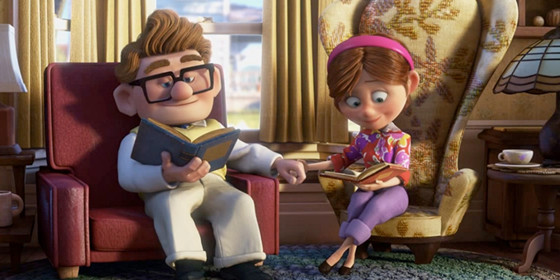
It feels like there has been so much written about this montage from the opening of Pixar’s 2009 sensation Up that there is not much else left to explain. There is not even much point in summarising the plot of the film since the scene comes so close to the beginning and essentially sets up the entire story as well as telling its own separate story without the use of a single spoken word.
I know it seems cliché to say something like “if you don’t cry at this scene you’re not human”, but it’s kind of true. Over the course of this montage, you feel every trial and tribulation of Carl and Ellie’s relationship, every moment of joy and wonder as well as the entire history of two lives spent together.
We already know this though, why does this scene work so well and hit us on such a harsh emotional level? Probably because of how intimate it feels. By the end of those four minutes, you are intensely familiar with the couple’s life and relationship, every inch of the frame is filled with some relevant detail relating to their character, what they mean to one another and how they make their way through life as well as continuously pointing out their hopes, dreams and aspirations. So by the time that ending rolls around, it’s those details that provide the emotional weight to the scene and give it such a catharsis.
7. Beach House Collapse in Eternal Sunshine of the Spotless Mind
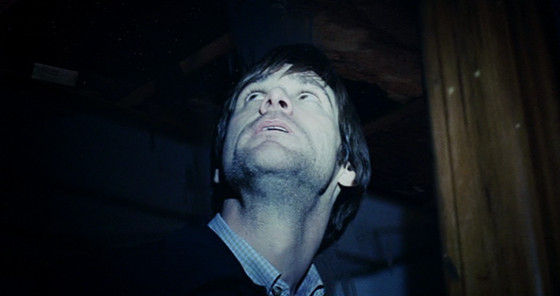
Charlie Kaufman works within big thinking concepts so often it’s a wonder his feet are still attached to the ground. His screenplays say so much about the human condition and how it navigates life itself can take an astonishingly existential viewpoint. There is a risk that such concepts can fly straight over your head and not relate to you at all, but in scenes like this Kaufman proves that he knows how to stay grounded and make these concepts poignantly relevant and deeply symbolic.
Following an estranged couple assembled of Jim Carey and Kate Winslet as they undergo a procedure to erase one another from their own memories. The film nears its conclusion with Carey clinging to the last vacant memory he has of his girlfriend, the day he first had met her at a beach house in Montauk. As he scrambles for a way to retain those memories, the house itself begins to disintegrate around him. It’s existential, haunting and endlessly poignant.
Then under Michel Gondry’s direction, the scene takes on an eerie sensibility to it, as well as a great sense of scale as we really feel the full effect of the house crashing down around us. The scene has an element of the horror of being trapped inside your own mind, as well as the importance of memories and naturally carries a hefty emotional weight to it.
6. Baptism in There Will Be Blood
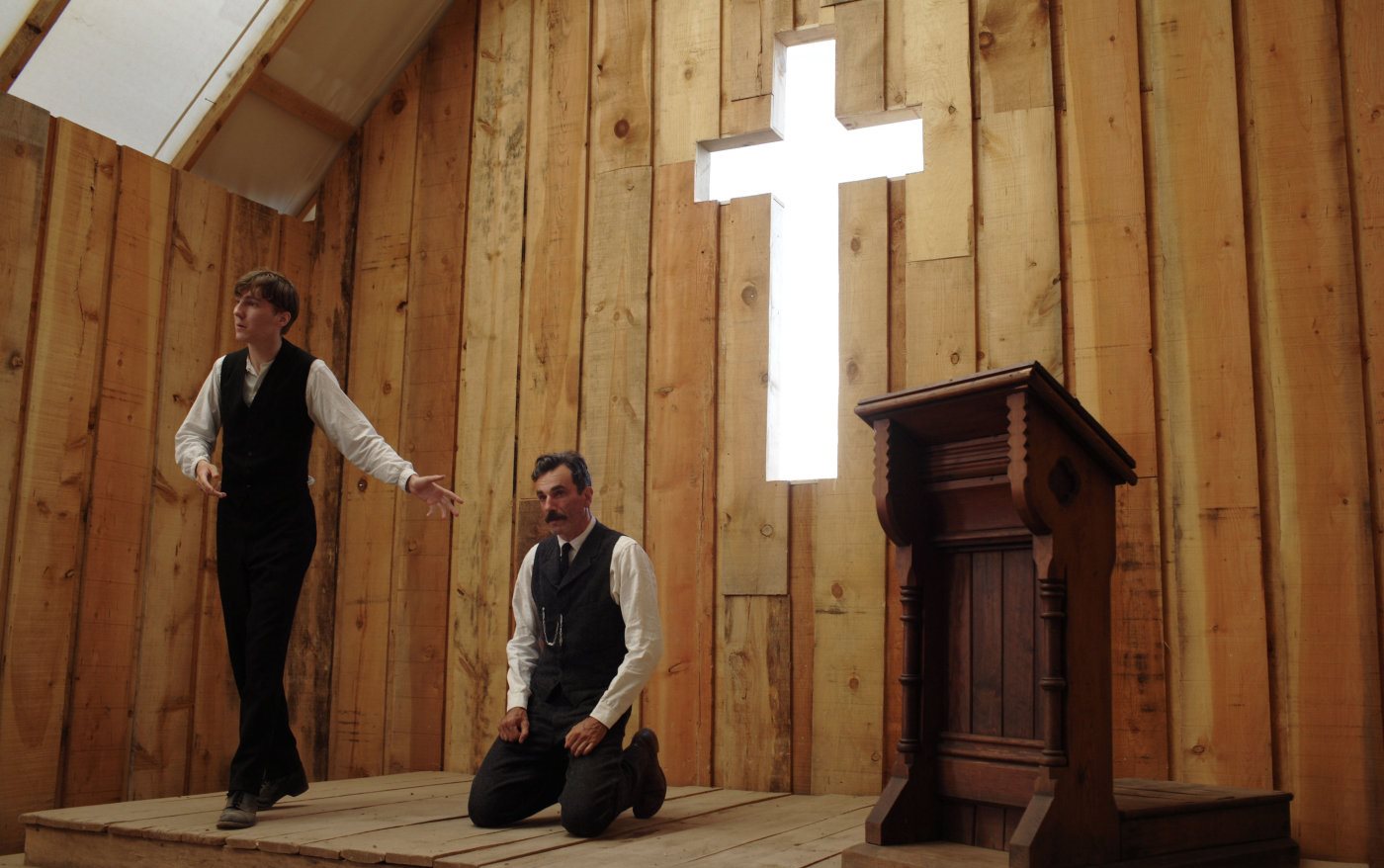
You would struggle to find a better performance from the decade than Daniel Day Lewis in Paul Thomas Anderson’s sweeping masterpiece. The study of the birth of American greed, following an ambitious man’s spiral into obsessive madness. One recurring theme throughout the film is Daniel Plainview’s conflict with preacher Eli Sunday and that conflict finally comes to ahead when Daniel is forced into accepting a baptism.
Right from the start of the scene, it is clear how reluctant Daniel is to go through with the ceremony, Day Lewis’ small facial twitches and twisted expressions make it obvious and Anderson is wise enough to leave his camera focused mainly on Daniel. He captures the manic intensity the pure ferocity and rage behind the admission of guilt that Plainview undergoes. As Eli takes his chance to humiliate Daniel, screaming that he has abandoned his child and coercing Plainview into stating that he is indeed a sinner.
It is this moment that There Will Be Blood transforms itself into a true masterpiece of modern cinema. For within this moment, as Eli screams and wails at him, we see an ounce of vulnerability in Plainview, some small inkling of regret and pain over what he has done. Until this point, There Will Be Blood was just a tale of a cold and unsympathetic oil baron, but in this brief second Plainview becomes human, one full of doubt and remorse.
Then of course we have a few more seconds of Eli revelling in this one moment of superiority he has over Plainview. But then when all is said and done, once the baptism is over, there is this small and brilliant moment when Daniel stands up again and turns to the preacher, Eli suddenly stops dead as if he has suddenly realised he has gone too far. Then the oil baron whispers something in his ear, what it is we don’t hear but it doesn’t matter, we already know what he said.
5. F**k You in 25th Hour
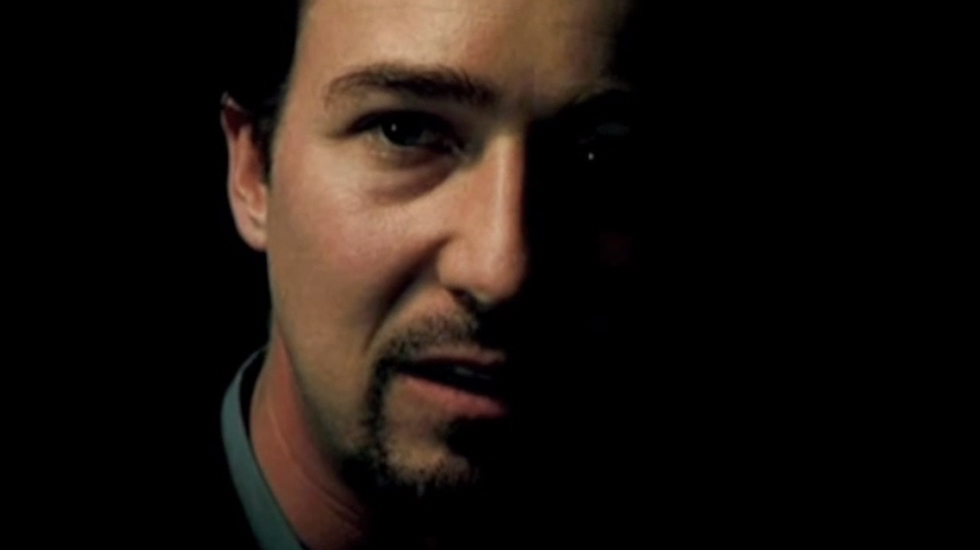
Sometimes a great scene is about more than just what’s happening in the moment. It can be a collection of images and spoken words that can form a message greater than the sum of its parts, summing up a whole society as well as a particular character. Such a scene can be found in Spike Lee’s 25th Hour, about the last 24 hours of Montgomery Brogan’s (Edward Norton) freedom before he is due to serve a seven year prison sentence for dealing drugs.
What Lee did with that story is summed up perfectly within this scene. He took an intimate story and used it to reflect an entirety of New York in its post 9/11 mind-set. When Monty comes face to face with himself in the mirror, he finds that someone has drawn a crude insult on the mirror. From there, he is launched into a giant rant against, pretty much everyone, all the New York stereotypes he can think of, from the cabbies to the firefighters, the corner grocers to the mobsters, as if he hates them all.
It cuts a route of rage, suspicion and anger through an entire city, targeting everyone who’s anyone from the large groups of society to the personal people within Monty’s life.
As Norton’s fury continues to vent outwards and expand to cover society, world affairs and all of religion in general his rant eventually turns on himself. It’s not just a display of underlying prejudices coupled with the challenges of multi-culturalism, it acts as a deeply honest portrayal of the characters own opinions, not necessarily because he is racist or angry at anyone in particular other than himself.
4. Reunion/First Date in Yi Yi
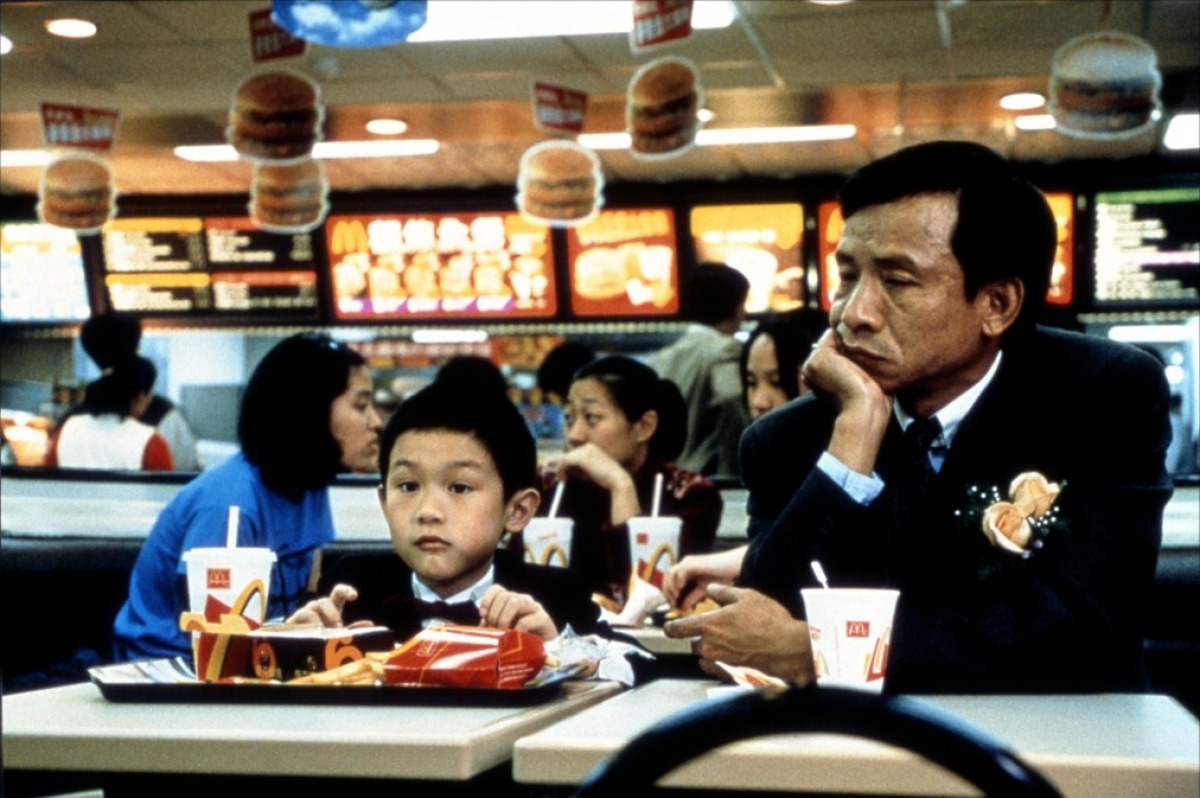
Edward Yang’s story of the emotional and economical struggles seen through the eyes of three generations is an astonishing work of ambition. As Harris Savides put it, “It was a film about everything and a film about nothing”. It draws its parallels through time and intergenerational conflict and comparison. Nowhere is that more present than the scene in which the films patriarch, played by Wu Nienjen reunites with an old girlfriend in Japan for a night out in the town.
Even in a movie filled with so many topics, all explored to such great depth and brilliant levity over the course of three hours, this remains the standout. As the couple recalls their first date Yang intercuts footage of Wu’s daughter apprehensively having her own first date back in Taipei.
Each shot is directed and shot beautifully with the cinematography of Wei-han Yang really coming into its own. As well as that each edit in time and space is so pitch perfect that it never feels disorienting or confusing, you’re able to follow each beat perfectly.
The film is rife with constant reminders of the ever changing and ever shifting passage of time, the numerous parallels from one generation to the next and the few prevailing aspects of life that we can cling to. This remains perhaps the only scene that is able to marry all of those themes together beautifully and in such perfect synchronicity.
3. The Farmhouse in Inglourious Basterds
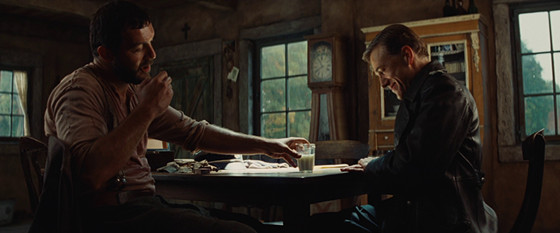
What Alfred Hitchcock did with silence, Quentin Tarantino does with small talk and the opening scene of his bloody and sprawling World War 2 epic Inglourious Basterds is perhaps the best example of that, and certainly one of the best scenes of the entire decade. The most obvious reason as to why this scene is great is because it is the one that starts the film Inglourious Basterds, but putting that aside the other reason that it towers above so many others is the way it introduced none other than Christoph Waltz.
The way that Waltz charms his way into the small farmhouse, the intimidating and utterly authoritative way he holds himself, the fact that he so completely and utterly commands that scene from start to finish forever cemented him within the public consciousness. Within ten minutes he had already secured that Oscar nomination, by the time the scene was over, the academy had already begun writing his name on the award.
But of course one can never disregard that wonderful Tarantino dialogue. The way the conversation goes from being casual pleasantries to one of a deadly game of cat and mouse. As the framer desperately tries to weave away from the conversation, you can feel the desperation in his eyes as he silently begs Landa to leave.
Then there is the way in which you come to the realisation of how intuitive Landa really is, the way it slowly dawns upon you that he already has the outcome worked out and is just waiting to strike. It’s perfection from start to finish.
2. Car Ambush in Children of Men
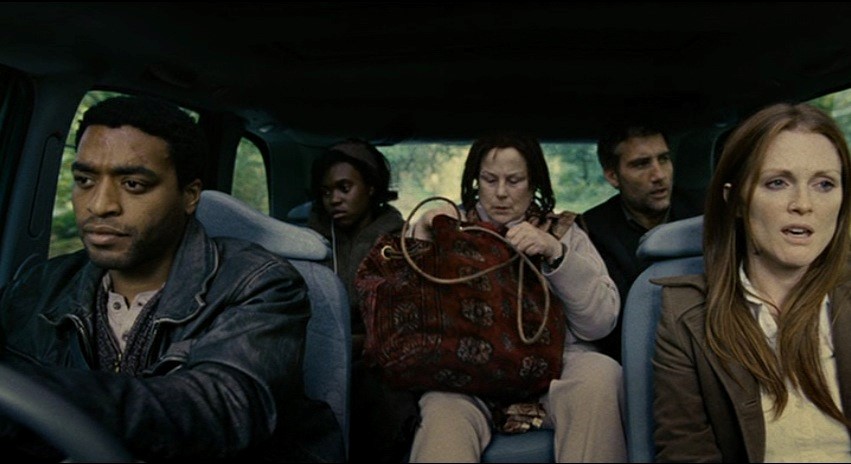
I think it’s safe to say that although we saw some fairly spectacular action scenes over the course of the 2000s, we never saw anything as engrossing, as immersive and as hauntingly thrilling as the car ambush from Children of Men.
Alfonso Cauron’s bleak science fiction tale about a humanity that is plagued by infertility features an astonishing tracking shot that is almost invisible to the viewer until long after the scene has actually begun, it’s so immersive and expertly shot as well as being impeccable acted and coordinated that it is hard to believe it was accomplished all within one take.
What makes this tracking shot unusual is just how confined it is, the camera’s view never leaves the interior of the car, focusing solely on the characters that inhabit it. The precision with which it does this is remarkable and completely absorbing, sucking you straight into this chaotic and unpredictable world. But it also brings a sense of familiarity to the characters, within the course of one scene you feel keenly intimate with each character even if at this point we still don’t know them all.
Then when the ambush is sprung, it all happens with such delicacy and exactness that once again you may struggle to comprehend it. As the camera moves around to observe the attackers on all side, it captures a terrific sense of danger and anarchy but never loses that intimacy it established earlier, and it was a smart move not to sacrifice it.
When those characters are placed in immediate danger we as an audience feel directly threatened as well, and when they are injured or worse, it strikes a personal blow to us as well. With that scene, Cauron truly placed his audience completely within the characters position.
1. The Coin Toss in No Country for Old Men
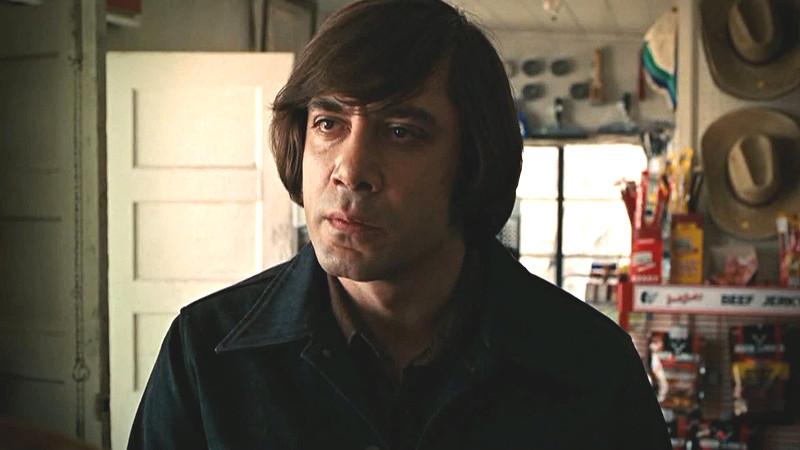
One often finds that the best scenes play out like small dramas of their own. Even without the context of the film surrounding it, they work absolutely perfectly. There are few other examples of a singular piece of filmmaking that is more masterful, more suspenseful and more intricately perfect than the iconic coin toss from No Country For Old Men. The atmosphere and detail just oozes from every second of screen time and the stakes only climb higher and higher as the scene progresses.
It isn’t even what you could regard as an essential scene. It doesn’t advance the plot, but the amount of depth it provides is unprecedented. Anthon Chigurh has stopped at a gas station and begins conversing with the clerk, eventually the two become involved in a wager only one of them fully understands, the coin flip will determine whether or not Chigurh kills the clerk.
The cat and mouse nature of their encounter is almost hypnotising, with the clerk repeatedly trying to crawl out of the trap he has been placed in, with Chigurh cutting off his ever escape attempt. Chigurh believes that if he is not destined to kill this man then fate will give him a sign, that is his world view, his way of comprehending the chaos of the universe around him.
It’s enough to put you on the edge of your seat and leave you there for days, a chilling portrait of a psychopath and his world view, a masterpiece of suspenseful filmmaking that rivals Hitchcock. It remains one of the finest parts of the Coen Brothers’ filmography and almost certainly the finest scene of the 2000s.
Author Bio: Joshua Price considers himself more of a fan that happens to write near insane ramblings on movies and directors like Scorsese, Spielberg, Bergman, Kubrick and Lumet rather than an actual critic and other insane ramblings can be found criticalfilmsuk.blogspot.co.uk.